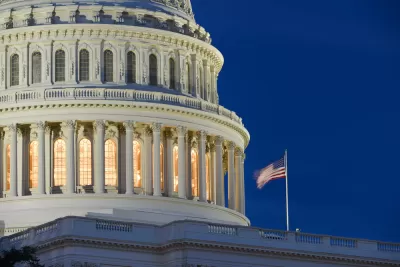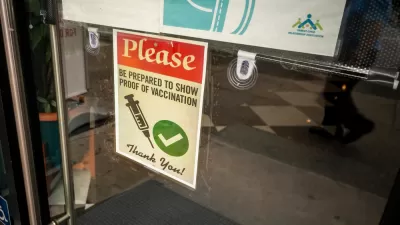A Senate joint resolution to roll back the Biden administration's only vaccine mandate to be upheld by the Supreme Court passed on a party-line vote on March 2. In Europe, the legislative branch often needs to approve these measures to become law.

No other country comes close to America's COVID death toll, over 957,000 on March 6, according to The New York Times global coronavirus tracker. Brazil is second with 652,000 followed by India with 515,000. The U.S. leads the world in daily coronavirus deaths, averaging 1,500, followed by Russia averaging 750.
One reason for the nation's failed response may stem from federal pandemic policy authorized by the executive branch with little input from Congress (unless funding is required), unlike European countries where parliamentary approval is often necessary, particularly for controversial measures. It should not come as a surprise that the polarization in American politics today would apply to the Biden administration's pandemic policies with dire consequences.
Senate vote
"The Senate voted on Wednesday to roll back President Biden’s vaccine mandate for health care workers at federally funded facilities, in a symbolic move orchestrated by Republicans who are pushing to weaponize pandemic precautions against Democrats in this year’s midterm congressional elections," reported Emily Cochrane for The New York Times on March 2.
In a vote forced by Republicans, the measure passed 49 to 44 along party lines, after six Democratic absences left the majority party short of the votes needed to defeat it. The measure is all but certain to die in the Democratic-controlled House; even if it cleared that chamber, the White House said on Wednesday that Mr. Biden would veto it [pdf].
The mandate, a regulation written by the Center for Medicare & Medicaid Services, a division of the Department of Health and Human Services, was one of four vaccination rules (see "scorecard" in a December post and the penultimate section of this post) aimed at the nation's workforce that comprised the most important and controversial aspect of the Biden administration's Path Out of the Pandemic plan developed to combat the Delta wave, unveiled last September.
The health care worker mandate was upheld in a dual ruling by the Supreme Court on Jan. 13 that blocked the most important vaccine regulation that applied to about 80 million workers in the private sector.
European approach
While Presiden Biden targeted the nation's workforce to increase vaccine-induced immunity in the nation's population, at least two European countries went further, targeting all adults or the most vulnerable demographic for "compulsory vaccination." Unlike the U.S., the leaders of both Austria and Greece had their respective parliaments approve the mandates. Greece even had their highest court approve the mandate for most 60+ people before it could be challenged.
Austria's compulsory vaccination applies to all adults. It was "adopted on January 20 by Parliament, signed into law by President Alexander Van der Bellen on [Jan. 21]," reported France24 on Feb. 5.
France already had taken a similar approach to Biden with its one vaccine mandate that applies to health workers. Like Greece and Austria, the measure was approved by Parliament.
Mandates are controversial
Denmark took a different approach toward vaccination, but like Greece, Austria, and France, Parliament had a say on these decisions. In the third pandemic post on this Nordic country, Michael Bang Petersen, a Danish researcher and political science professor at Aarhus University who led a global survey of COVID attitudes and advises the Danish government, told The Atlantic's Derek Thompson on Feb. 4:
In Denmark, people are in favor of vaccines, with more than 81 percent of adults doubly vaccinated, but also very opposed to vaccine mandates. There are no political parties in Parliament that are loudly advocating for vaccine mandates.
But also, research suggests that vaccine mandates might enhance what makes people anti-vaccine in the first place, like distrust of authorities and feeling like they’re being forced to do something that’s bad for them.
According to the Times tracker, the percentage of the population that is fully vaccinated in Denmark, France, Austria and Greece is 82%, 78%, 74%, and 70%, respectively, on March 6. In the U.S.: 65%.
Back to the U.S. Senate vote on March 2, Cochrane cited a first-term senator from Kansas, also an MD, who sponsored the legislation to roll back the mandate.
“This vaccine mandate is not about public health or science,” Senator Roger Marshall, a Kansas Republican who is a physician, said in a speech on the Senate floor, a stethoscope draped around his neck. “The Biden administration’s mandate is about fulfilling their desire to control every aspect of our lives..."
Another Senate rollback
The following day, Marshall announced the passage of Senate Joint Resolution 38 intended to reduce the president's executive authority during the pandemic.
U.S. Senator Roger Marshall, M.D. released the following statement after the U.S. Senate voted 48-47 in favor of his legislation to end the COVID-19 national state of emergency [pdf] currently in effect under the National Emergencies Act (NEA). Despite all scientific advances and our possession of a much greater understanding of COVID, President Joe Biden stealthily extended the national emergency declaration two weeks ago. You may click HERE or on the image below to watch Senator Marshall’s speech...
On Feb. 22, the American Hospital Association noted the extension of the emergency declaration beyond March 1, acknowledging that they had "urged the president to extend the emergency declaration to ensure that [Section 1135] waivers and Medicaid coverage flexibilities for the COVID-19 emergency continue."
Marshall's resolution likely faces the same fate as the other bill he sponsored, S.J. Res. 32, to roll back the health care worker vaccine mandate described in the source article.
Federal vaccination regulations scorecard
As noted earlier, four vaccinations requirements were the basis for Biden's 'Path out of the Pandemic' that was unveiled last September. The health care mandate was upheld by the Supreme Court on Jan. 13 and the private large employer rule was blocked in a separate ruling on the same day (both covered here.)
The two remaining vaccine mandates apply to the federal workforce and private contractors for the federal government are both blocked and waiting to be heard in in federal appeals courts.
- "A federal judge in Texas blocked the Biden administration’s vaccine mandate for federal workers nationwide Friday [Jan. 21], in a ruling that leans on a Supreme Court order last week that stopped a similar rule for larger businesses," reported Roll Call on Jan. 21. The Associated Press reported that the 5th U.S. Circuit Court of Appeals in New Orleans ruled 2-1 on Feb. 10 to deny the Biden administration's request for an injunction while they appeal the lower court's ruling.
- The federal contractor regulation was blocked by a Kentucky district court on Nov. 30. The next week, a U.S. district court judge in Atlanta blocked it nationwide. As of March 3, the mandate "remains under a nationwide injunction," according to JD Supra. "Oral argument currently is scheduled for April 8, 2022 before the [US Court of Appeals for the Eleventh Circuit in Atlanta.]
National COVID-19 Preparedness Plan
The vaccine mandate-based "Path Out of the Pandemic" is no more, replaced by the National COVID-19 Preparedness Plan on March 2.
"The plan, meant to help the United States transition to what some are calling a 'new normal,' has four main goals: protecting against and treating Covid-19; preparing for new variants; avoiding shutdowns; and fighting the virus abroad," reports The New York Times on March 2, that day after the President Biden announced the new approach to the pandemic during his State of the Union address.
Related in Planetizen: Path Out of the Pandemic court rulings
- Supreme Court: OSHA Exceeded its Public Health Authority; In a separate decision, it upheld a vaccine mandate for most health care workers, January 18, 2022
- Biden's 'Path Out of the Pandemic' Imperiled by Multiple Court Decisions, December 5, 2021
- Another Biden COVID Vaccine Mandate on Hold [Health care workers], December 1, 2021
- Biden Orders Large Employers to Require Vaccination or COVID Testing, September 13, 2021
European approach:
- Danish Paradox: High COVID Transmission Leads to Endemicity, February 14, 2022
- Compulsory Vaccination in the Birthplace of Democracy, December 6, 2021
- Austria to Mandate COVID-19 Vaccination, November 22, 2021
- Mandating and Verifying Vaccinations (in France), July 19, 2021
FULL STORY: In Symbolic Vote, Senate Rejects Vaccine Mandate for Health Workers

Maui's Vacation Rental Debate Turns Ugly
Verbal attacks, misinformation campaigns and fistfights plague a high-stakes debate to convert thousands of vacation rentals into long-term housing.

Planetizen Federal Action Tracker
A weekly monitor of how Trump’s orders and actions are impacting planners and planning in America.

In Urban Planning, AI Prompting Could be the New Design Thinking
Creativity has long been key to great urban design. What if we see AI as our new creative partner?

How Trump's HUD Budget Proposal Would Harm Homelessness Response
Experts say the change to the HUD budget would make it more difficult to identify people who are homeless and connect them with services, and to prevent homelessness.

The Vast Potential of the Right-of-Way
One writer argues that the space between two building faces is the most important element of the built environment.

Florida Seniors Face Rising Homelessness Risk
High housing costs are pushing more seniors, many of them on a fixed income, into homelessness.
Urban Design for Planners 1: Software Tools
This six-course series explores essential urban design concepts using open source software and equips planners with the tools they need to participate fully in the urban design process.
Planning for Universal Design
Learn the tools for implementing Universal Design in planning regulations.
Gallatin County Department of Planning & Community Development
Heyer Gruel & Associates PA
JM Goldson LLC
City of Camden Redevelopment Agency
City of Astoria
Transportation Research & Education Center (TREC) at Portland State University
Jefferson Parish Government
Camden Redevelopment Agency
City of Claremont





























